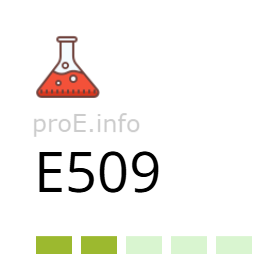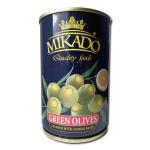
Other names for the additive (synonyms)
General Information
Calcium chloride (food additive E509) is a salt of calcium and hydrochloric acid, used in the food industry as a firming agent, thickener, or stabilizer.
The chemical formula of additive E509: CaCl2. Visually, calcium chloride appears as colorless crystals (in some cases whitish), which dissolve well in alcohol and water and freeze at low temperatures.
In nature, pure calcium chloride is almost never found. Plants and animals contain Ca²⁺ and Cl⁻ ions, but they do not form a stable compound of calcium chloride.
On an industrial scale, additive E509 is produced synthetically by two main methods: as a by-product in the Solvay soda production process and by neutralizing hydrochloric acid with limestone (calcium carbonate).
Effects on the Body
Risks of additive E509
Food additive E509 quickly dissociates in the stomach into calcium and chloride ions, which are then fully absorbed in the intestines. Excess chloride is excreted mainly through the kidneys.
Excessive total calcium intake may cause gastrointestinal irritation, diarrhea, increased gastric acidity, and in some cases — ulcerative lesions of the stomach lining.
In a report by the EFSA Panel on Food Additives and Flavourings, it is noted that excessive consumption of calcium salts may also lead to hypercalcaemia, especially in individuals with impaired kidney function.
The Panel noted that chlorides have low acute oral toxicity and do not raise concerns regarding genotoxicity or carcinogenicity. In reproductive toxicity studies in rats, administration of magnesium chloride hexahydrate at a dose of 800 mg/kg body weight per day revealed no adverse effects.
In 2019, the EFSA Panel on Food Additives and Flavourings confirmed that consumption of calcium chloride from food additives within established levels does not raise health concerns.
Benefits of additive E509
Calcium is essential for muscle function, bone tissue maintenance, and mineral metabolism. Although the content of calcium chloride in the final food product is quite small, calcium ions from additive E509 can serve as an auxiliary source of calcium for the human body.
Uses
Additive E509 enhances protein binding, improving product texture and density. In the food industry, calcium chloride can be used:
- in the production of cheese, cottage cheese, and powdered milk — improves texture and increases product yield;
- in canned fruits and vegetables — maintains firmness and enhances salty taste;
- in marmalade and jelly — increases gelling capacity;
- in cream before pasteurization — reduces acidity;
- in caviar and vegetable/fruit juices — stabilizes consistency;
- in confectionery products (e.g., chocolate) — prevents sugar crystallization;
- in brewing — adjusts the mineral composition of water.
Additive E509 may also be included in dairy products. It compensates for calcium loss, which occurs during milk pasteurization.
Besides the food industry, calcium chloride is used:
- in the chemical industry — as a reagent for analyses;
- in the production of rubber, latex, and natural caoutchouc;
- in glue production;
- in medicine — for lactic acid production and as a calcium source;
- in metallic calcium production;
- in refrigeration — as a component of coolants;
- in gas production — during gas preparation for transportation;
- in road maintenance — as an anti-icing agent and for dust suppression on gravel roads.
Legal Status
In the European Union, additive E509 is considered safe and permitted for use under Regulation (EC) No 1333/2008. EFSA has assessed intake levels as safe when dosage recommendations are followed. In the United States, calcium chloride is included in the GRAS list (Generally Recognized As Safe). In Ukraine, the United Kingdom, and many other countries, additive E509 is also approved for use in the food industry.
